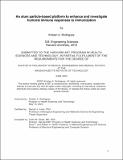An alum particle-based platform to enhance and investigate humoral immune responses to immunization
Author(s)
Rodrigues, Kristen A.
DownloadThesis PDF (10.36Mb)
Advisor
Irvine, Darrell J.
Terms of use
Metadata
Show full item recordAbstract
Slow delivery of vaccines has been shown to amplify humoral immune responses compared to traditional bolus immunization, but clinical translation of frequent repeated immunizations is challenging. In this thesis, we investigate the use of peptide linkers containing consecutive phosphoserine residues (pSer) designed to mediate ligand exchange interactions between pSer- conjugated antigens and aluminum hydroxide (alum) particles in order to mediate slow delivery of antigen from the injection site depot to the draining lymph nodes (dLNs). We optimized this pSer/alum platform for a SARS-CoV-2 RBD antigen and an HIV envelope trimer MD39, systematically modulating characteristics of both the antigen and pSer linker to maximize on- target, vaccine relevant responses. These optimized pSer-antigen designs elicited robust antigen- specific germinal center B cell and serum antibody responses in mice, with synergistically amplified humoral immunity when co-anchored with phosphate-containing molecular adjuvants CpG and SMNP. Based on the prolonged retention of antigen at the injection site in physiological conditions with the pSer/alum approach, we next applied a fluorescence resonance energy transfer-based approach to track antigen stability longitudinally. A substantial fraction of antigen remains intact after three weeks at the injection site with the optimized alum-anchored, pSer-conjugated MD39 trimer. The pSer/alum approach promoted significantly improved antigen delivery to the follicular dendritic cell (FDC) network in the dLNs compared to soluble MD39, with most antigen in the dLN FDC intact through at least day 28. The pSer modification approach employed here provides a simple and robust strategy to prolong antigen availability in a clinically translatable vaccine regimen.
Date issued
2023-06Department
Harvard-MIT Program in Health Sciences and TechnologyPublisher
Massachusetts Institute of Technology